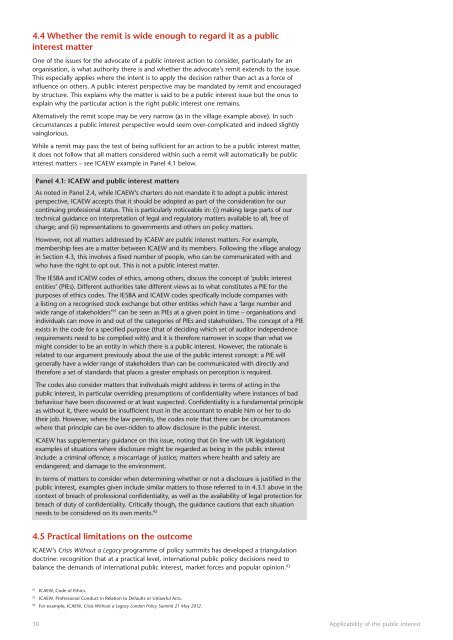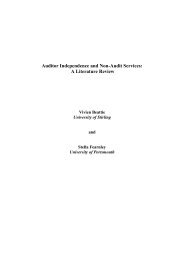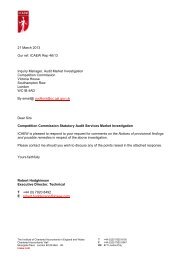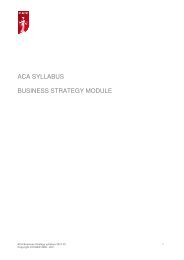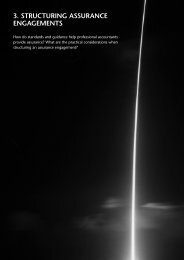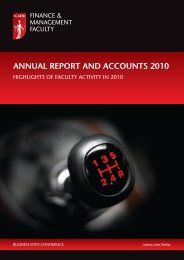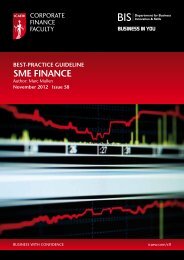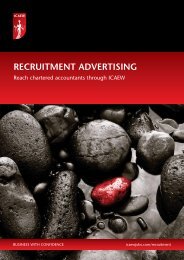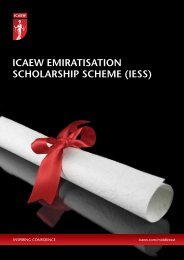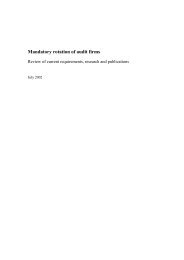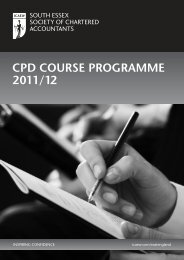Acting in the public interest â a framework for analysis - ICAEW
Acting in the public interest â a framework for analysis - ICAEW
Acting in the public interest â a framework for analysis - ICAEW
- No tags were found...
Create successful ePaper yourself
Turn your PDF publications into a flip-book with our unique Google optimized e-Paper software.
4.4 Whe<strong>the</strong>r <strong>the</strong> remit is wide enough to regard it as a <strong>public</strong><strong>in</strong>terest matterOne of <strong>the</strong> issues <strong>for</strong> <strong>the</strong> advocate of a <strong>public</strong> <strong>in</strong>terest action to consider, particularly <strong>for</strong> anorganisation, is what authority <strong>the</strong>re is and whe<strong>the</strong>r <strong>the</strong> advocate’s remit extends to <strong>the</strong> issue.This especially applies where <strong>the</strong> <strong>in</strong>tent is to apply <strong>the</strong> decision ra<strong>the</strong>r than act as a <strong>for</strong>ce of<strong>in</strong>fluence on o<strong>the</strong>rs. A <strong>public</strong> <strong>in</strong>terest perspective may be mandated by remit and encouragedby structure. This expla<strong>in</strong>s why <strong>the</strong> matter is said to be a <strong>public</strong> <strong>in</strong>terest issue but <strong>the</strong> onus toexpla<strong>in</strong> why <strong>the</strong> particular action is <strong>the</strong> right <strong>public</strong> <strong>in</strong>terest one rema<strong>in</strong>s.Alternatively <strong>the</strong> remit scope may be very narrow (as <strong>in</strong> <strong>the</strong> village example above). In suchcircumstances a <strong>public</strong> <strong>in</strong>terest perspective would seem over-complicated and <strong>in</strong>deed slightlyva<strong>in</strong>glorious.While a remit may pass <strong>the</strong> test of be<strong>in</strong>g sufficient <strong>for</strong> an action to be a <strong>public</strong> <strong>in</strong>terest matter,it does not follow that all matters considered with<strong>in</strong> such a remit will automatically be <strong>public</strong><strong>in</strong>terest matters – see <strong>ICAEW</strong> example <strong>in</strong> Panel 4.1 below.Panel 4.1: <strong>ICAEW</strong> and <strong>public</strong> <strong>in</strong>terest mattersAs noted <strong>in</strong> Panel 2.4, while <strong>ICAEW</strong>’s charters do not mandate it to adopt a <strong>public</strong> <strong>in</strong>terestperspective, <strong>ICAEW</strong> accepts that it should be adopted as part of <strong>the</strong> consideration <strong>for</strong> ourcont<strong>in</strong>u<strong>in</strong>g professional status. This is particularly noticeable <strong>in</strong>: (i) mak<strong>in</strong>g large parts of ourtechnical guidance on <strong>in</strong>terpretation of legal and regulatory matters available to all, free ofcharge; and (ii) representations to governments and o<strong>the</strong>rs on policy matters.However, not all matters addressed by <strong>ICAEW</strong> are <strong>public</strong> <strong>in</strong>terest matters. For example,membership fees are a matter between <strong>ICAEW</strong> and its members. Follow<strong>in</strong>g <strong>the</strong> village analogy<strong>in</strong> Section 4.3, this <strong>in</strong>volves a fixed number of people, who can be communicated with andwho have <strong>the</strong> right to opt out. This is not a <strong>public</strong> <strong>in</strong>terest matter.The IESBA and <strong>ICAEW</strong> codes of ethics, among o<strong>the</strong>rs, discuss <strong>the</strong> concept of ‘<strong>public</strong> <strong>in</strong>terestentities’ (PIEs). Different authorities take different views as to what constitutes a PIE <strong>for</strong> <strong>the</strong>purposes of ethics codes. The IESBA and <strong>ICAEW</strong> codes specifically <strong>in</strong>clude companies witha list<strong>in</strong>g on a recognised stock exchange but o<strong>the</strong>r entities which have a ‘large number andwide range of stakeholders’ 91 can be seen as PIEs at a given po<strong>in</strong>t <strong>in</strong> time – organisations and<strong>in</strong>dividuals can move <strong>in</strong> and out of <strong>the</strong> categories of PIEs and stakeholders. The concept of a PIEexists <strong>in</strong> <strong>the</strong> code <strong>for</strong> a specified purpose (that of decid<strong>in</strong>g which set of auditor <strong>in</strong>dependencerequirements need to be complied with) and it is <strong>the</strong>re<strong>for</strong>e narrower <strong>in</strong> scope than what wemight consider to be an entity <strong>in</strong> which <strong>the</strong>re is a <strong>public</strong> <strong>in</strong>terest. However, <strong>the</strong> rationale isrelated to our argument previously about <strong>the</strong> use of <strong>the</strong> <strong>public</strong> <strong>in</strong>terest concept: a PIE willgenerally have a wider range of stakeholders than can be communicated with directly and<strong>the</strong>re<strong>for</strong>e a set of standards that places a greater emphasis on perception is required.The codes also consider matters that <strong>in</strong>dividuals might address <strong>in</strong> terms of act<strong>in</strong>g <strong>in</strong> <strong>the</strong><strong>public</strong> <strong>in</strong>terest, <strong>in</strong> particular overrid<strong>in</strong>g presumptions of confidentiality where <strong>in</strong>stances of badbehaviour have been discovered or at least suspected. Confidentiality is a fundamental pr<strong>in</strong>cipleas without it, <strong>the</strong>re would be <strong>in</strong>sufficient trust <strong>in</strong> <strong>the</strong> accountant to enable him or her to do<strong>the</strong>ir job. However, where <strong>the</strong> law permits, <strong>the</strong> codes note that <strong>the</strong>re can be circumstanceswhere that pr<strong>in</strong>ciple can be over-ridden to allow disclosure <strong>in</strong> <strong>the</strong> <strong>public</strong> <strong>in</strong>terest.<strong>ICAEW</strong> has supplementary guidance on this issue, not<strong>in</strong>g that (<strong>in</strong> l<strong>in</strong>e with UK legislation)examples of situations where disclosure might be regarded as be<strong>in</strong>g <strong>in</strong> <strong>the</strong> <strong>public</strong> <strong>in</strong>terest<strong>in</strong>clude: a crim<strong>in</strong>al offence; a miscarriage of justice; matters where health and safety areendangered; and damage to <strong>the</strong> environment.In terms of matters to consider when determ<strong>in</strong><strong>in</strong>g whe<strong>the</strong>r or not a disclosure is justified <strong>in</strong> <strong>the</strong><strong>public</strong> <strong>in</strong>terest, examples given <strong>in</strong>clude similar matters to those referred to <strong>in</strong> 4.3.1 above <strong>in</strong> <strong>the</strong>context of breach of professional confidentiality, as well as <strong>the</strong> availability of legal protection <strong>for</strong>breach of duty of confidentiality. Critically though, <strong>the</strong> guidance cautions that each situationneeds to be considered on its own merits. 924.5 Practical limitations on <strong>the</strong> outcome<strong>ICAEW</strong>’s Crisis Without a Legacy programme of policy summits has developed a triangulationdoctr<strong>in</strong>e: recognition that at a practical level, <strong>in</strong>ternational <strong>public</strong> policy decisions need tobalance <strong>the</strong> demands of <strong>in</strong>ternational <strong>public</strong> <strong>in</strong>terest, market <strong>for</strong>ces and popular op<strong>in</strong>ion. 9391<strong>ICAEW</strong>, Code of Ethics.92<strong>ICAEW</strong>, Professional Conduct <strong>in</strong> Relation to Defaults or Unlawful Acts.93For example, <strong>ICAEW</strong>, Crisis Without a Legacy London Policy Summit 21 May 2012.30Applicability of <strong>the</strong> <strong>public</strong> <strong>in</strong>terest


